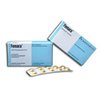BUY FEMARA NOW!

INDICATIONS
Femara is used for primarily treating certain kinds of breast cancer in women past menopause. Femara is an aromatase inhibitor. It works by reducing the total amount of estrogen produced primarily in the body. This helps to starve cancer cells by depriving them of estrogen.
INSTRUCTIONS
Use Femara as directed by your doctor.
- Take Femara by mouth with or without food.
- Take Femara on a regular schedule to get the most benefit from it.
- If you miss a dose of Femara, take it as soon as possible. If it is almost time for the next dose, skip the missed dose and go back to your regular dosing schedule. Do not take 2 doses at once.
Ask your health care provider any questions you may have about how to use Femara.
STORAGE
Store Femara at 77 degrees F (25 degrees C). Brief storage at temperatures between 59 and 86 degrees F (15 and 30 degrees C) is permitted. Store away from heat, moisture, and light. Do not store in the bathroom. Keep Femara out of the reach of children and away from pets.
MORE INFO:
Active Ingredient: Letrozole.
Do NOT use Femara if:
- you are allergic to any ingredient in Femara
- you have not started menopause.
Contact your doctor or health care provider right away if any of these apply to you.
Some medical conditions may interact with Femara. Tell your doctor or pharmacist if you have any medical conditions, especially if any of the following apply to you:
- if you are pregnant, planning to become pregnant or are breast-feeding
- if you are taking any prescription or nonprescription medicine, herbal preparation, or dietary supplement
- if you have allergies to medicines or other substances
- if you have liver problems or high cholesterol
- if you are still having menstrual periods or have not completely finished menopause
- if you are taking hormone replacement therapy (HRT).
Some medicines may interact with Femara. Tell your health care provider if you are taking any other medicines, especially any of the following:
- Tamoxifen because it may decrease Femara's effectiveness.
This may not be a complete list of all interactions that may occur. Ask your health care provider if Femara may interact with other medicines that you take. Check with your health care provider before you start, stop, or change the dose of any medicine.
Important safety information:
- Femara may cause drowsiness or dizziness. These effects may be worse if you take it with alcohol or certain medicines. Use Femara with caution. Do not drive or perform other possible unsafe tasks until you know how you react to it.
- Femara may cause dizziness; alcohol, hot weather, exercise, or fever may increase this effect. To prevent dizziness, sit up or stand slowly, especially in the morning. Sit or lie down at the first sign of dizziness.
- If you may become pregnant, you must use effective birth control while you take Femara. Women who are going through or have recently gone through menopause may still become pregnant. Talk with your doctor about the use of effective birth control while you take Femara.
- Lab tests, including bone mineral density or cholesterol levels, may be performed while you use Femara. These tests may be used to monitor your condition or check for side effects. Be sure to keep all doctor and lab appointments.
- Use Femara with caution in the elderly; they may be more sensitive to its effects.
- Femara should not be used in children; safety and effectiveness in children have not been confirmed.
- Pregnancy and breast-feeding: Do not use Femara if you are pregnant. Avoid becoming pregnant while you are taking it. If you think you may be pregnant, contact your doctor right away. It is not known if Femara is found in breast milk. If you are or will be breast-feeding while you use Femara, check with your doctor. Discuss any possible risks to your baby.
All medicines may cause side effects, but many people have no, or minor, side effects.
Check with your doctor if any of these most common side effects persist or become bothersome:
Back, leg, or arm pain; breast pain; constipation; cough; diarrhea; dizziness; headache; hot flashes; flushing; increased sweating; indigestion; joint or muscle pain; loss of appetite; mild swelling or fluid retention; nausea; night sweats; sleeplessness; stomach pain; tiredness; vaginal dryness or irritation; vomiting; weakness; weight gain or loss.
Seek medical attention right away if any of these severe side effects occur:
Severe allergic reactions (rash; hives; itching; difficulty breathing; tightness in the chest; swelling of the mouth, face, lips, or tongue; unusual hoarseness); calf pain or tenderness; chest pain; confusion; fever, chills, or sore throat; increased or painful urination; numbness of an arm or leg; one-sided weakness; severe or persistent bone pain; severe stomach pain; shortness of breath; sudden severe headache, vomiting, dizziness, or fainting; swelling of the ankles or feet; unexplained vaginal bleeding or discharge; vision or speech changes.